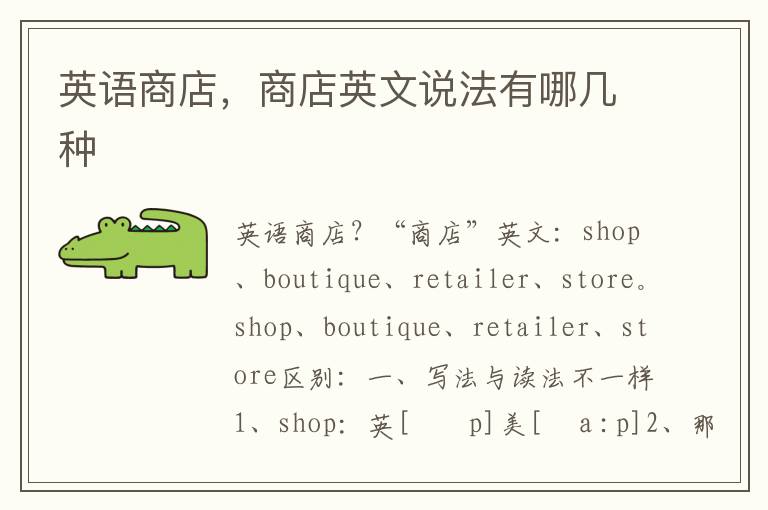【简介】感谢网友“雕龙文库”参与投稿,这里小编给大家分享一些,方便大家学习。
11.1 一般现在时的用法
1) 经常性或习惯性的动作,常与表示频度的时间状语连用。时间状语: every, sometimes, at, on Sunday。例如:
I leave home for school at 7 every morning. 每天早上我七点离开家。
2) 客观真理,客观存在,科学事实。例如:
The earth moves around the sun. 地球绕太阳转动。
Shanghai lies in the east of China. 上海位于中国东部。
3) 表示格言或警句。例如:
Pride goes before a fall. 骄者必败。
注意:此用法如果出现在宾语从句中,即使主句是过去时,从句谓语也要用一般现在时。
例:Columbus proved that the earth is round. 哥伦布证实了地球是圆的。
4) 现在时刻的状态、能力、性格、个性。例如:
I dont want so much. 我不要那么多。
Ann writes good English but does not speak well.
安英语写得不错,讲的可不行。
比较:Now I put the sugar in the cup. 把糖放入杯子。
I am doing my homework now. 我正在做功课。
第一句用一般现在时,用于操作演示或指导说明的示范性动作,表示言行的瞬间动作。第二句中的now是进行时的标志,表示正在进行的动作的客观状况,所以后句用一般现在时。
11.2 一般过去时的用法
1)在确定的过去时间里所发生的动作或存在的状态。例如:时间状语有:yesterday, last week, an hour ago, the other day, in 1982等。例如:
Where did you go just now? 刚才你上哪儿去了?
2)表示在过去一段时间内,经常性或习惯性的动作。例如:
When I was a child, I often played football in the street.
我是个孩子的时候,常在马路上踢足球。
Whenever the Browns went during their visit, they were given a
warm welcome.
那时,布朗一家无论什么时候去,都受到热烈欢迎。
3)句型:It is time for sb. to do sth 到时间了 该了。例如:It is
time for you to go to bed. 你该睡觉了。
It is time that sb. did sth. 时间已迟了 早该了 ,例如It is time you
went to bed. 你早该睡觉了。
would (had) rather sb. did sth. 表示宁愿某人做某事。例如:Id rather you
came tomorrow.还是明天来吧。
4) wish, wonder, think, hope 等用过去时,作试探性的询问、请求、建议等,而一般过去时表示的动作或状态都已成为过去,现已不复存在
。例如:I thought you might have some. 我以为你想要一些。
比较:Christine was an invalid all her life.(含义:她已不在人间。)
Christine has been an invalid all her life.(含义:她现在还活着)
Mrs. Darby lived in Kentucky for seven years.
(含义:达比太太已不再住在肯塔基州。)
Mrs. Darby has lived in Kentucky for seven years.
(含义:现在还住在肯塔基州,有可能指刚离去)
注意: 用过去时表示现在,表示委婉语气。
1)动词want, hope, wonder, think, intend 等。例如:
Did you want anything else? 您还要些什么吗?
I wondered if you could help me. 能不能帮我一下。
2)情态动词 could, would。例如:
Could you lend me your bike? 你的自行车,能借用一些吗?
11.3 used to / be used to
used to + do:过去常常表示过去习惯性的动作或状态,但如今已不存在。例如:
Mother used not to be so forgetful. 老妈过去没那么健忘。
Scarf used to take a walk. 斯卡夫过去常常散步。
be used to + doing:对已感到习惯,或习惯于,to是介词,后需加名词或动名词。例如:
He is used to a vegetarian diet.
Scarf is used to taking a walk. 斯卡夫现在已习惯于散步了。
典型例题
---- Your phone number again? I ___ quite catch it.
---- Its 69568442.
A. didnt B. couldnt C. dont D. cant
答案A. 本句虽没有明确的时间状语,但从语意上看出,在听的时候没有听懂这个动作发生在过去,因此应用过去时。
11.4 一般将来时
1) shall用于第一人称,常被will 所代替。will 在陈述句中用于各人称,在征求意见时常用于第二人称。例如:
Which paragraph shall I read first? 我先读哪一段呢?
Will you be at home at seven this evening? 今晚七点回家好吗?
2) be going to +不定式,表示将来。
a. 主语的意图,即将做某事。例如:What are you going to do tomorrow? 明天打算作什么呢?
b. 计划,安排要发生的事。例如:The play is going to be produced next
month。这出戏下月开播。
c. 有迹象要发生的事。例如:Look at the dark clouds, there is going to be a
storm. 看那乌云,快要下雨了。
3) be +不定式表将来,按计划或正式安排将发生的事。例如:
We are to discuss the report next Saturday.我们下星期六讨论这份报告。
4) be about to +不定式,意为马上做某事。例如:
He is about to leave for Beijing. 他马上要去北京。
注意:be about to do 不能与tomorrow, next week 等表示明确将来时的时间状语连用。
11.5 be going to / will 用于条件句时,be going to表将来,will表意愿。例如:
If you are going to make a journey, youd better get ready for it as soon as possible.
Now if you will take off your clothes, we will fit the new clothes on you in front of the mirror.
11.6 be to和be going to
be to 表示客观安排或受人指示而做某事,be going to 表示主观的打算或计划。例如:
I am to play football tomorrow afternoon. 明天下午我去踢球。(客观安排)
Im going to play football tomorrow afternoon.
明天下午我想去踢球。(主观安排)
11.7 一般现在时表将来
1)下列动词come, go, arrive, leave, start, begin, return的一般现在时可以表示将来,主要用来表示在时间上已确定或安排好的事情。例如:
The train leaves at six tomorrow morning. 火车明天上午六点开。
When does the bus star? It stars in ten minutes. 汽车什么时候开?十分钟后。
2)以here, there等开始的倒装句,表示动作正在进行。例如:
Here comes the bus. = The bus is coming. 车来了。
There goes the bell. = The bell is ringing. 铃响了。
3)在时间或条件句中。例如:
When Bill comes (不是will come), ask him to wait for me. 比尔来后,让他等我。
Ill write to you as soon as I arrive there. 我到了那里,就写信给你。
4)在动词hope, take care that, make sure that等的宾语从句中。例如:
I hope they have a nice time next week. 我希望他们下星期玩得开心。
Make sure that the windows are closed before you leave the room. 离开房间前,务必把窗户关了。
11.8 用现在进行时表示将来
下列动词come, go, arrive, leave, start, begin, return等现在进行时可以表示将来。例如:
Im leaving tomorrow. 明天我要走了。
Are you staying here till next week? 你会在这儿呆到下周吗?
11.9 现在完成时
现在完成时用来表示之前已发生或完成的动作或状态,其结果的影响现在还存在;也可表示持续到现在的动作或状态。其构成:have(has) +过去分词。
11.10 比较一般过去时与现在完成时
1)一般过去时表示过去某时发生的动作或单纯叙述过去的事情,强调动作;现在完成时为过去发生的,强调过去的事情对现在的影响,强调的是影响。
2)一般过去时常与具体的时间状语连用,而现在完成时通常与模糊的时间状语连用,或无时间状语。
一般过去时的时间状语:yesterday, last week,ago, in1980, in October, just
now等,皆为具体的时间状语。
现在完成时的时间状语:for, since, so far, ever, never, just, yet, till/until, up to now, in past years, always等,皆不确定的时间状语。
共同的时间状语:this morning, tonight, this April, now, already, recently, lately 等。
3)现在完成时可表示持续到现在的动作或状态,动词一般是延续性的,如live, teach, learn, work, study, know.。
一般过去时常用的非持续性动词有come, go, leave, start, die, finish, become, get married等。例如:
I saw this film yesterday. (强调看的动作发生过了)
I have seen this film. (强调对现在的影响,电影的内容已经知道了)
Why did you get up so early? (强调起床的动作已发生过了)
Who hasnt handed in his paper? (强调有卷子未交,疑为不公平竞争)
He has been in the League for three years. (在团内的状态可延续)
He has been a League member for three years. (是团员的状态可持续)
句子中如有过去时的时间副词(如yesterday, last, week, in 1960)时,不能使用现在完成时,要用过去时。
(错)Tom has written a letter to his parents last night.
(对)Tom wrote a letter to his parents last night.
11.11 用于现在完成时的句型
1)It is the first / second time.... that结构中的从句部分,用现在完成时。例如:
It is the first time that I have visited the city. 这是我第一次访问这城市。
This is the first time (that) Ive heard him sing. 这是我第一次听他唱歌。
注意:It was the third time that the boy had been late.
2)This is +形容词最高级+that结构,that 从句要用现在完成时。例如:
This is the best film that Ive (ever) seen. 这是我看过的最好的电影。
典型例题
(1) ---Do you know our town at all? ---No, this is the first time I ___ here.
A. was B. have been C. came D. am coming
答案B. This is the first time 后面所加从句应为现在完成时,故选B。
(2) ---Have you ____ been to our town before? ---No, its the first time I ___ here.
A. even, come B. even, have come C. ever, come D. ever, have come
答案D. ever意为曾经或无论何时,反意词为never,此两词常用于完成时。
注意:非延续性动词的否定形式可以与表示延续时间的状语连用。即动作不发生的状态是可以持续的。
(错)I have received his letter for a month.
(对)I havent received his letter for almost a month.
11.12 比较since和for
Since 用来说明动作起始时间,for用来说明动作延续时间长度。例如:
I have lived here for more than twenty years.我住在这儿二十多年了。
I have lived here since I was born. 我从出生起就住在这儿了。
注意:并非有for 作为时间状语的句子都用现在完成时。
I worked here for more than twenty years. (我现在已不在这里工作。)
I have worked here for many years.(现在我仍在这里工作。)
注意:用句型转换的方法,很容易排除非延续动词在有for/since结构的完成时中的误用。
1)(对) Tom has studied Russian for three years. = Tom began to study Russian three years ago, and is still studying it now.
2)(错) Harry has got married for six years. = Harry began to get married six years ago, and is still getting married now.
显然,第二句不对,它应改为 Harry got married six years ago. 或 Harry has been married for six years.
11.13 since的四种用法
1) since +过去一个时间点(如具体的年、月、日期、钟点、1980, last month, half past
six)。例如:
I have been here since 1989. 1989起,我一直在这儿。
2) since +一段时间+ ago。例如:
I have been here since five months ago. 我在这儿,已经有五个月了。
3) since +从句。例如:
Great changes have taken place since you left. 你走后,变化可大了。
Great changes have taken place since we were here. 我们走后,变化可大了。
4) It is +一段时间+ since从句。例如:
It is two years since I became a postgraduate student. 我考上研究生有两年了。
11.14 延续动词与瞬间动词
1) 用于完成时的区别
延续动词表示经验、经历; 瞬间动词表示行为的结果,不能与表示段的时间状语连用。例如:
He has completed the work. 他已完成了那项工作。 (表结果)
Ive known him since then. 我从那时起就认识他了。(表经历)
2) 用于till / until从句的差异
延续动词用于肯定句,表示做直到 瞬间动词用于否定句,表示到,才。例如:
He didnt come back until ten oclock. 他到10 点才回来。
He slept until ten oclock. 他一直睡到10点。
典型例题
1. You dont need to describe her. I ___ her several times.
A. had met B. have met C. met D. meet
答案B. 首先本题后句强调对现在的影响,我知道她的模样,你不用描述。再次,several
times告知为反复发生的动作,因此用现在完成时。
2. ---Im sorry to keep you waiting.
---Oh, not at all. I ___here only a few minutes.
A. have been B. had been C. was D. will be
答案A. 等待的动作由过去开始,持续到现在,应用现在完成时。
11.15 过去完成时
1) 概念:表示过去的过去
----|----------|--------|---- 其构成是had +过去分词构成。 那时以前 那时 现在
2) 用法
a. 在told, said, knew, heard, thought等动词后的宾语从句。例如:
She said (that)she had never been to Paris. 她告诉我她曾去过巴黎。
b. 状语从句
在过去不同时间发生的两个动作中,发生在先,用过去完成时;发生在后,用一般过去时。例如:
When the police arrived, the thieves had run away. 警察到达时,小偷们早就跑了。








